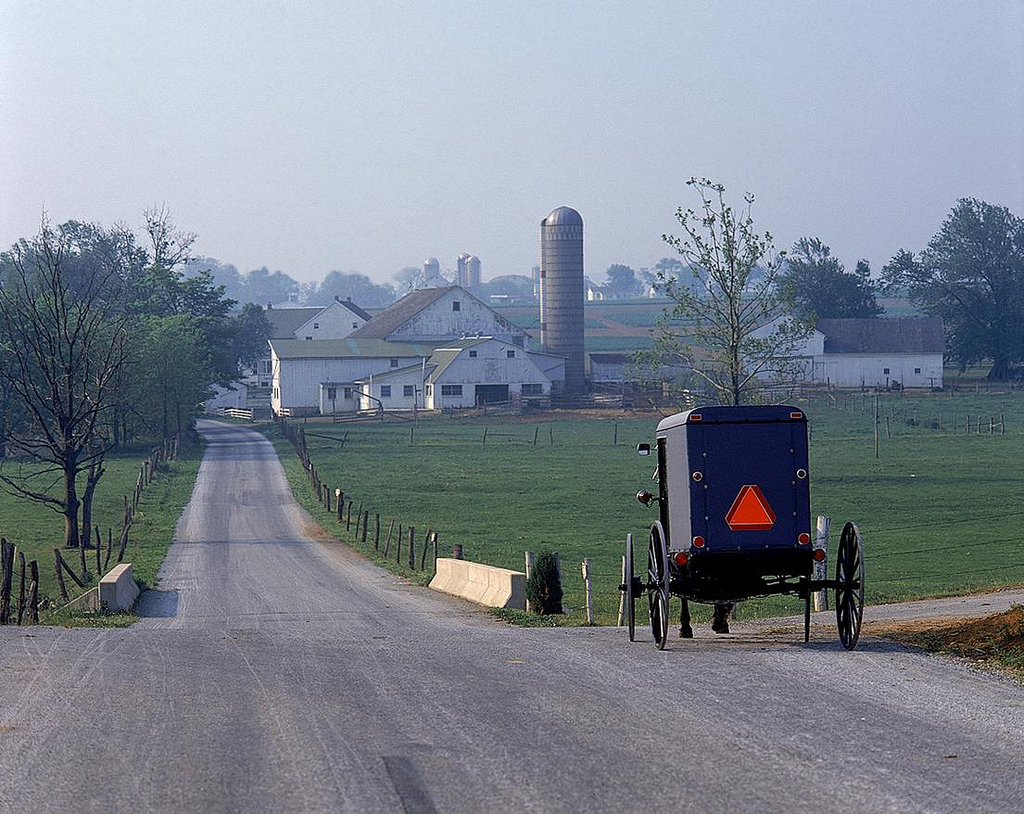 Horses and buggies against a backdrop of 18-wheelers along a major highway – stereotypical imagery of Lancaster County, Pa. Habitually, people see the area’s stanch divide — the Amish and modern people; there’s no middle ground. In reality, there’s more ethnic richness in this area, said Dr. Jeff Bach, director of Elizabethtown College’s Young Center for Anabaptist and Pietist Studies and associate professor of religious studies. In addition to the Amish, several disciplines of Anabaptist, Mennonites, Pietist groups and Church of the Brethren members reside in Lancaster County. Mennonite immigrant groups in central Pennsylvania include African, Asian, Haitian, Hispanic and French-speaking Africans in Mount Joy, Pa, said Dr. Conrad Kanagy, Elizabethtown College professor of sociology.
Horses and buggies against a backdrop of 18-wheelers along a major highway – stereotypical imagery of Lancaster County, Pa. Habitually, people see the area’s stanch divide — the Amish and modern people; there’s no middle ground. In reality, there’s more ethnic richness in this area, said Dr. Jeff Bach, director of Elizabethtown College’s Young Center for Anabaptist and Pietist Studies and associate professor of religious studies. In addition to the Amish, several disciplines of Anabaptist, Mennonites, Pietist groups and Church of the Brethren members reside in Lancaster County. Mennonite immigrant groups in central Pennsylvania include African, Asian, Haitian, Hispanic and French-speaking Africans in Mount Joy, Pa, said Dr. Conrad Kanagy, Elizabethtown College professor of sociology.
Bach and Kanagy collaborate for the first time to offer the two-week May term course: REL 170 Amish and Anabaptist Groups in Context. The course is hosted at Elizabethtown, but is open to the public as a 4-credit college course.
People are often stunned to learn Lancaster County includes more than just Amish and modern people, Bach said. “We hope to key in on that surprise,” he said. In the late 17-th century, Pennsylvania was seen as a place of religious freedom and it continues to serve as a place of refuge, Bach said. The educators hope to expose students to the ethnic richness of the area, making them aware through multi-ethnic experiences and establishing respect for religious differences. “We hope to build bridges of understanding,” Bach said.
Bach brings historical information to the classroom; Kanagy presents a sociological prospective and, collectively, they are well-versed in theology. Bach is knowledgeable in the Church of the Brethren and pietist groups, while Kanagy is familiar with the Old Order Amish and Mennonites.
Someone from a National Park Service site in Pennsylvania already registered for the course, Bach said, noting that the course presents the texture of Pennsylvania’s religious content, through history and culture. “I learn every time I teach. This is a course I look forward to myself,” he said.
The course includes more than 40 hours outside the classroom, including an overnight trip to Kanagy’s hometown in Belleville, Pa. Further showcasing cultural diversity, the class visits Lancaster representatives from an Ethiopian, Vietnamese and Spanish-speaking Anabaptist congregation. Additional interactive lessons include attending an Old Order River Brethren Sunday morning service; touring an Amish farm, followed by dinner with the family; and visiting Green Dragon, a market near Ephrata. Contrary to the stereotypical view of Green Dragon, as an ‘Amish’ market, Bach described it as a prime location to observe Amish behavior. The market is a place for Amish to socialize and interact, Bach said. Students may have the opportunity to interact with the Amish in this social sett ing, he said.
I hope they get a good glimpse of the ethics and richness in Lancaster County, coming away with a new appreciation and new ability to relate to people with different ethnic background.”
All out-of-class interactions with individuals are based on personal relationships and research of Kanagy, Bach and Dr. Donald Kraybill, Elizabethtown College distinguished professor and senior fellow at the Young Center. Kanagy has Amish relatives in Belleville and currently, serves as a Mennonite pastor. Through this position he has interacted with a variety of Mennonite immigrant groups.
The course will also welcome two guest speakers: David Weaver-Zercher, professor of American religious history at nearby Messiah College, and Kraybill, internationally recognized for his scholarship on the Amish and other Anabaptist groups.
“It’s an unusual class,” Kanagy said, commenting on the course’s compact presentation, including a wide range of religious disciplines within two weeks. “It’s a fascinating look at variations of local Anabaptist.” Bach described the course’s compact structure as “emotionally and intellectually challenging.” He noted that the course is not heavy on lectures or writing.
Kanagy commented that the course will explore a variety of questions. Why are there differences within groups with shared theological roots? How do these groups negotiate a place in the world? And how are these groups sharing faith with their children over time?
“I hope students learn about and appreciate the richness of the world and of Plain people in Lancaster,” Bach said. “There are a lot of stereotypes driven by the media. Their personal lives are more rich than that. … I hope they get a good glimpse of the ethics and richness in Lancaster County, coming away with a new appreciation and new ability to relate to people with different ethnic background,” Bach said.
Individuals interested in the course can contact Bach for registration and additional information, bachj@etown.edu or 717-361-1470.

